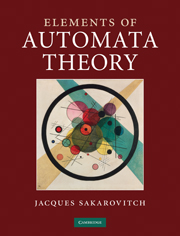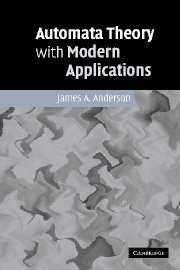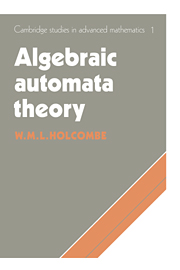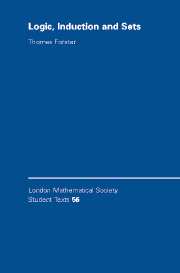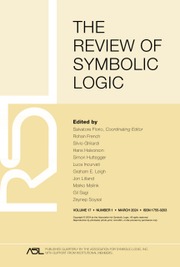Elements of Automata Theory
Automata theory lies at the foundation of computer science, and is vital to a theoretical understanding of how computers work and what constitutes formal methods. This treatise gives a rigorous account of the topic and illuminates its real meaning by looking at the subject in a variety of ways. The first part of the book is organised around notions of rationality and recognisability. The second part deals with relations between words realised by finite automata, which not only exemplifies the automata theory but also illustrates the variety of its methods and its fields of application. Many exercises are included, ranging from those that test the reader, to those that are technical results, to those that extend ideas presented in the text. Solutions or answers to many of these are included in the book.
- Goes beyond the elementary results presented in other books on the subject
- Provides full proofs for all required elementary results in linear algebra
- Contains over 500 exercises and solutions
Reviews & endorsements
"The book is printed on beautiful paper, with wide margins and a nice typeface. The cover art is a painting by Kandinsky, which continues Cambridge University Press’ use of modern art for theoretical CS texts. The writing is lively for a mathematical text. The English rendering of the original French is easy to read and, as far as I can tell, maintains the spirit of the original. Although the intended audience is graduate students, the writing is so clear that it might work for mathematically prepared advanced undergraduates."
Paul Cull, Computing Reviews
"Despite its modest title, this book is an extremely comprehensive and well-written analysis of the field. The Cambridge University Press edition is an English translation of the original French edition. Even though the material is often quite technical, it is obvious that great effort has been expended to make the book readable and even interesting. Over and over, the author’s sense of humor comes through, with numerous literary references and brief asides to the reader. The author states the book’s philosophy in the preface: “Simple properties are proved simply, then interpreted as special cases of global propositions expressed in more abstract terms.” A book that follows its philosophy so closely is a rare find. If you want to learn about the algebraic aspects of automata theory, this is definitely your book."
K. Harrow, Computing Reviews
"This book should be on the shelf of every serious student and professional. It will enjoy a very long stay on my own."
George Hacken, Computing Reviews
"This is a splendid monograph that will be a reference text for the next few decades. It is a pleasure to read; it is written with skill, with an eye for motivation, details and language, and sometimes with a touch of humor."
Peter R.J. Asveld, Mathematical Reviews
"Overall I found the book very enlightening. It has provided me new perspectives of several theorems that I assumed I understood completely. It was a joy for me to read this book and I recommend this book for anyone who is interested in automata theory (or more generally complexity theory) and wants to know the fundamental theorms of theory of computing. This book is definitely unique in its approach and the topics chosen."
Shiva Kinali for SIGACT News
Product details
No date availableAdobe eBook Reader
9781139632874
0 pages
0kg
275 b/w illus. 520 exercises
This ISBN is for an eBook version which is distributed on our behalf by a third party.
Table of Contents
- Foreword
- 0. Fundamental structures
- 1. The simplest possible machine
- 2. The power of algebra
- 3. The pertinence of enumeration
- 4. The richness of transducers
- 5. The simplicity of functional transducers
- Bibliography
- Index.

